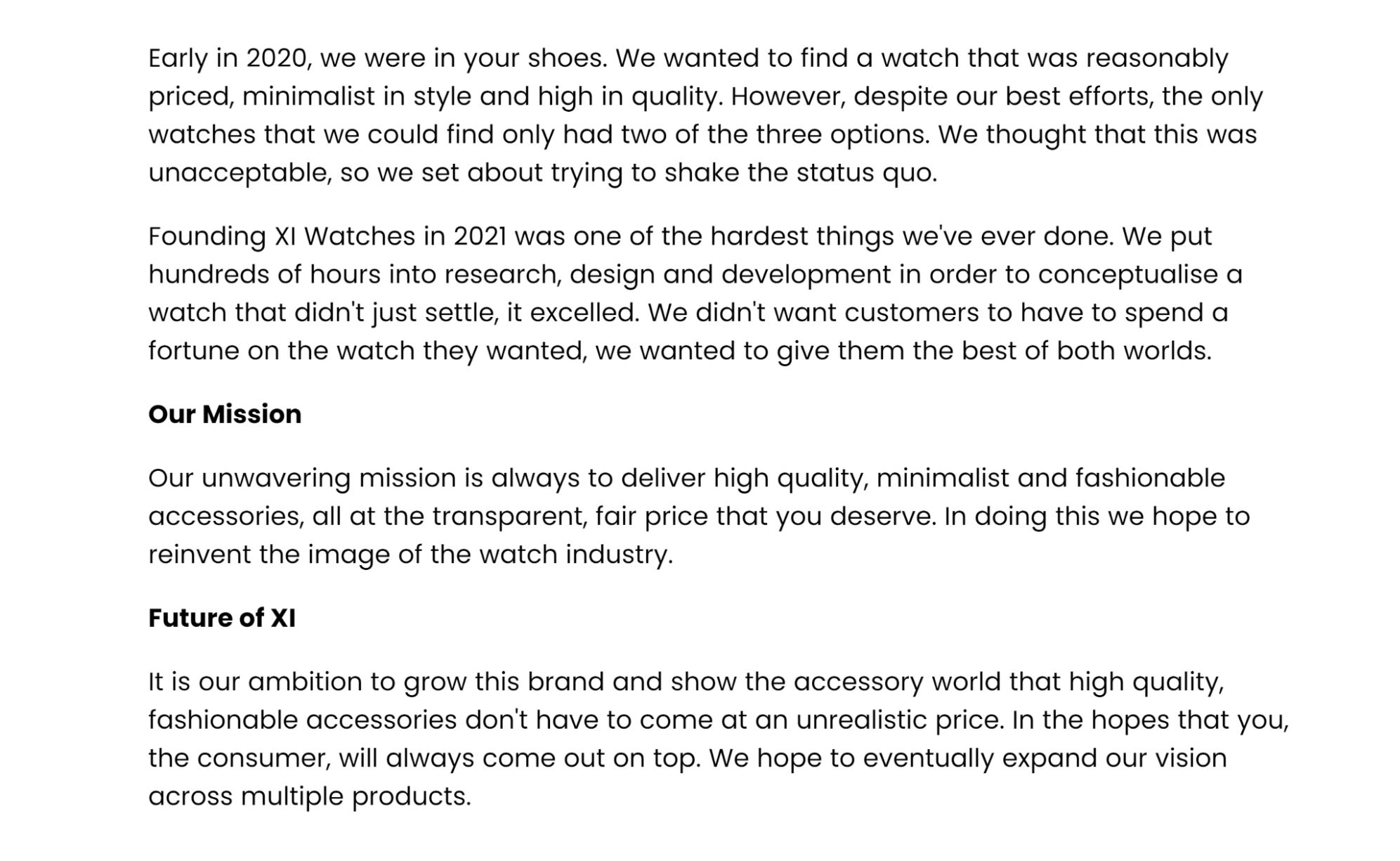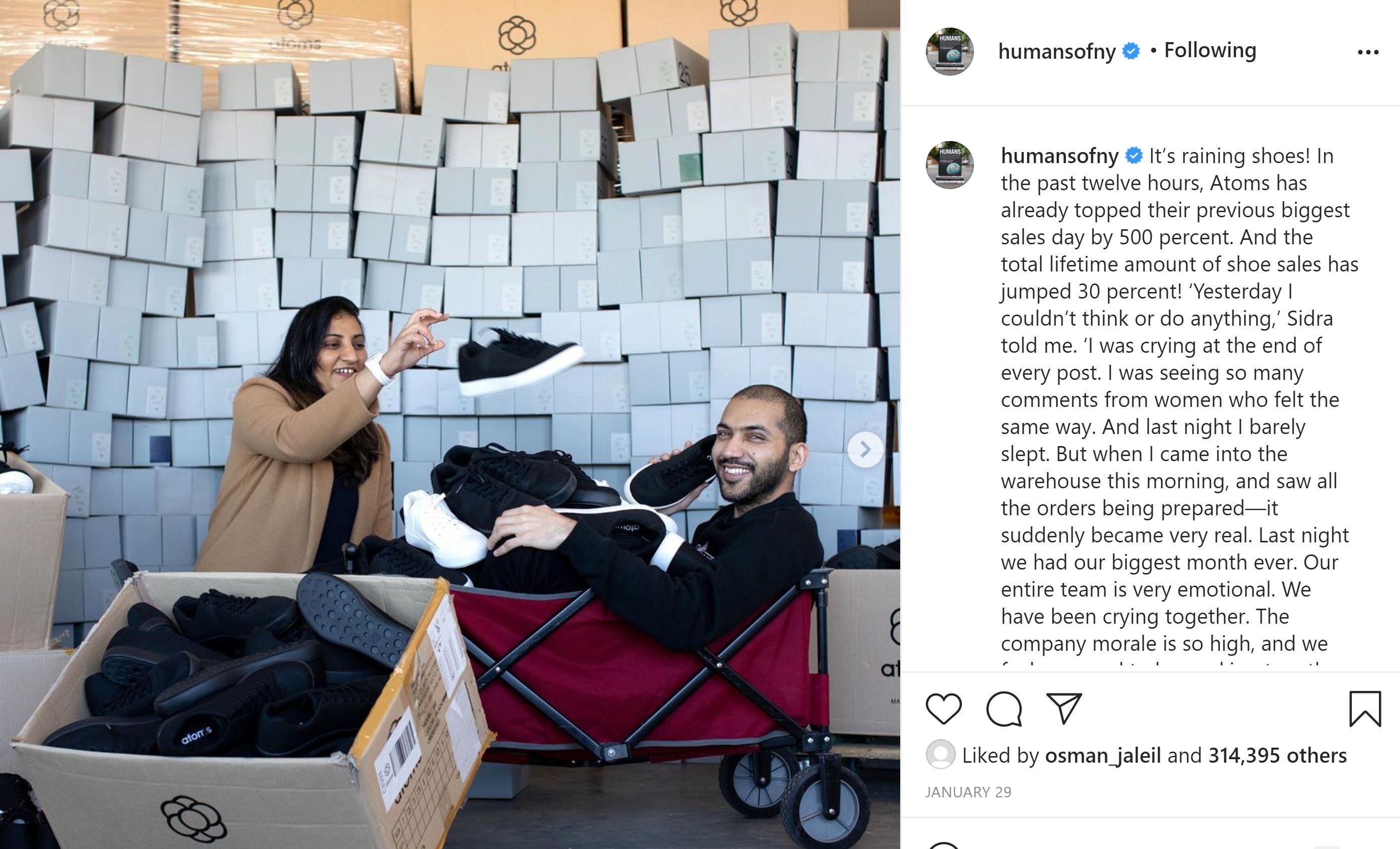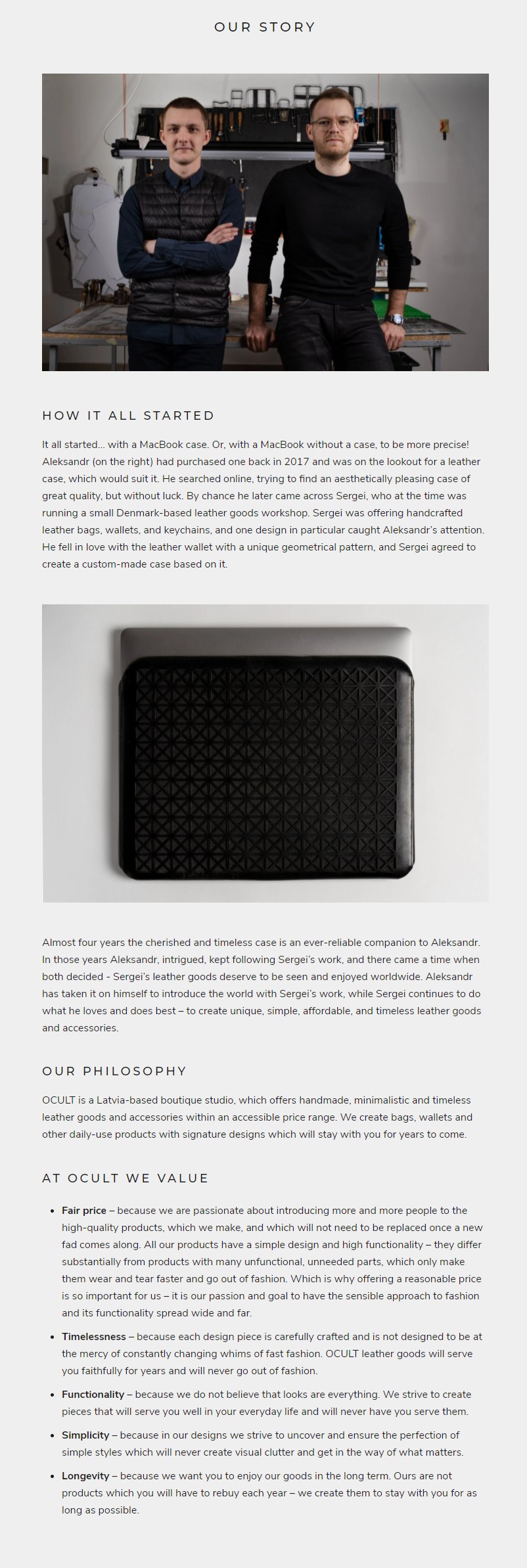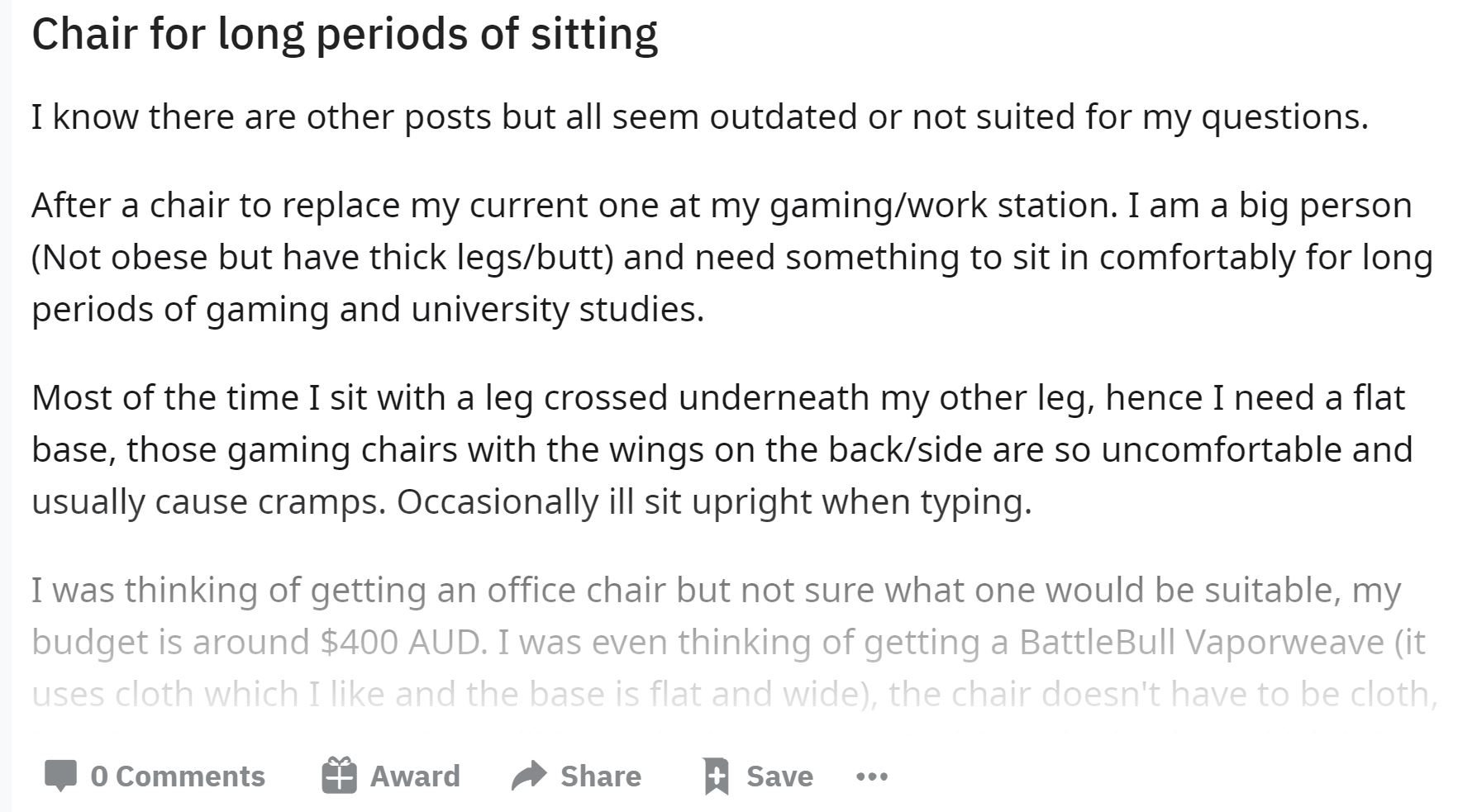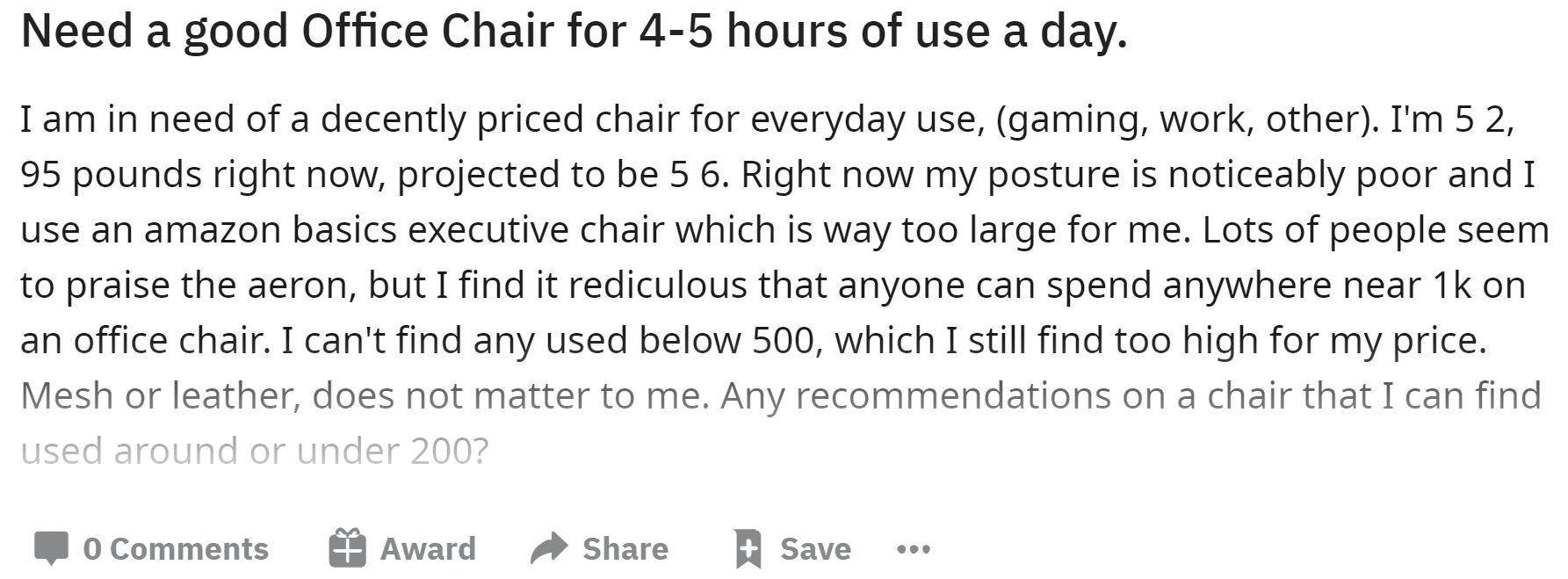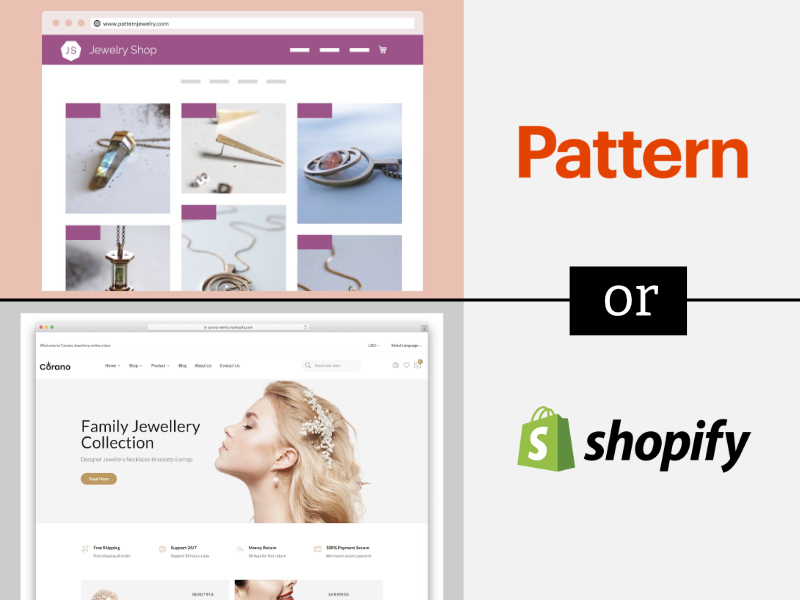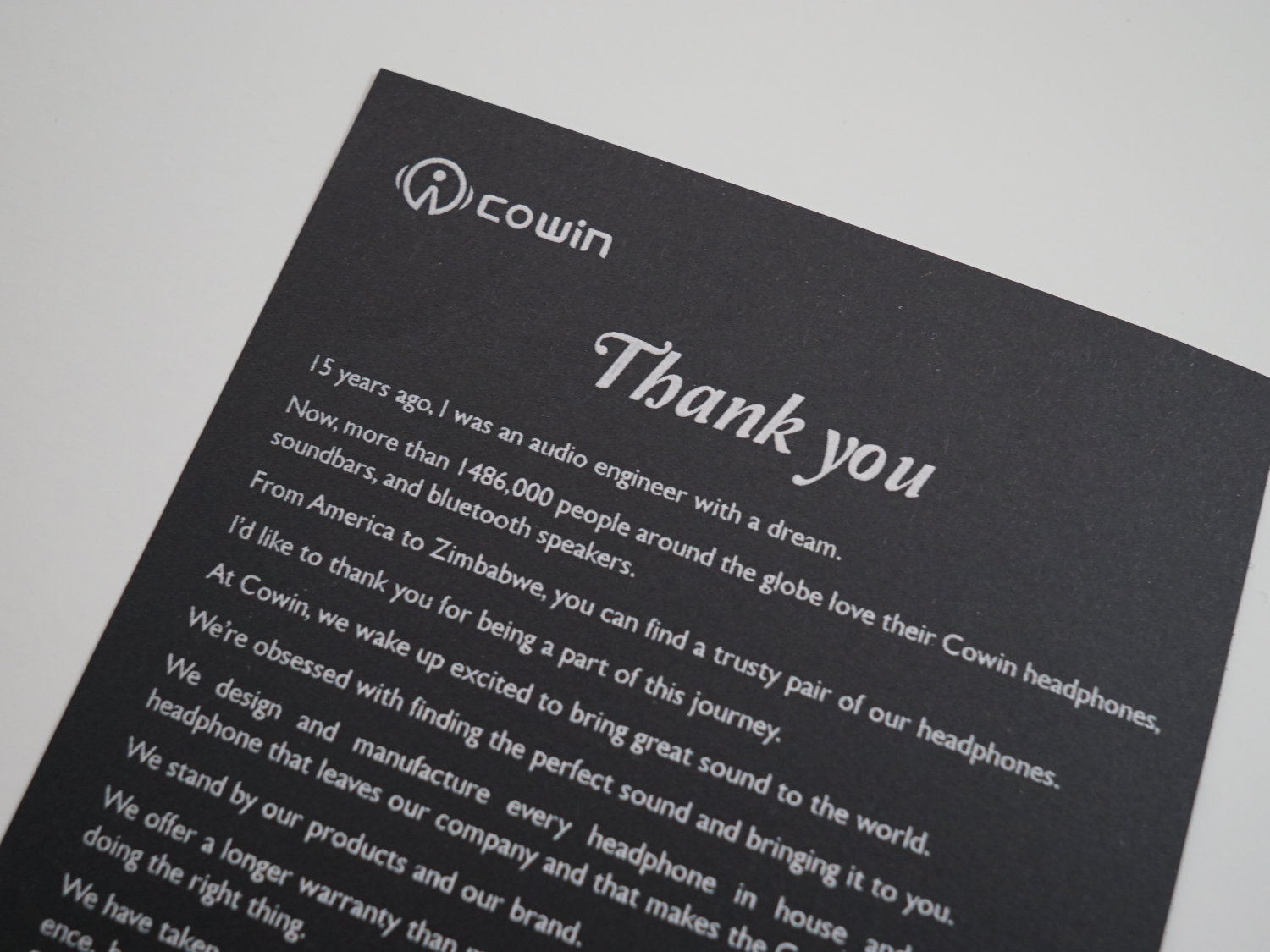
At the end of last year, I ordered a new pair of Cowin headphones. It came in a big black box. In the box, it came with this card that describes the founder’s story.
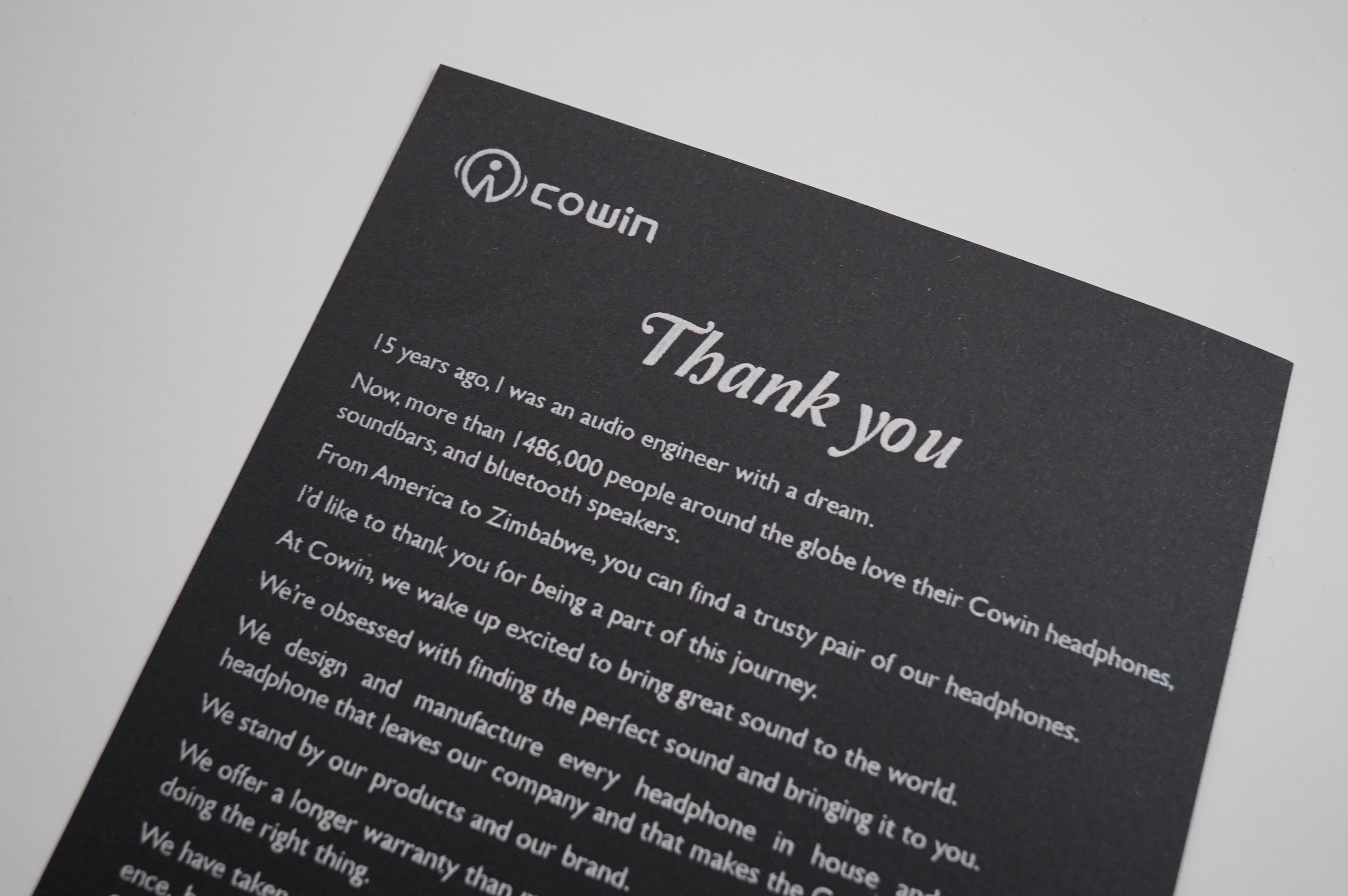
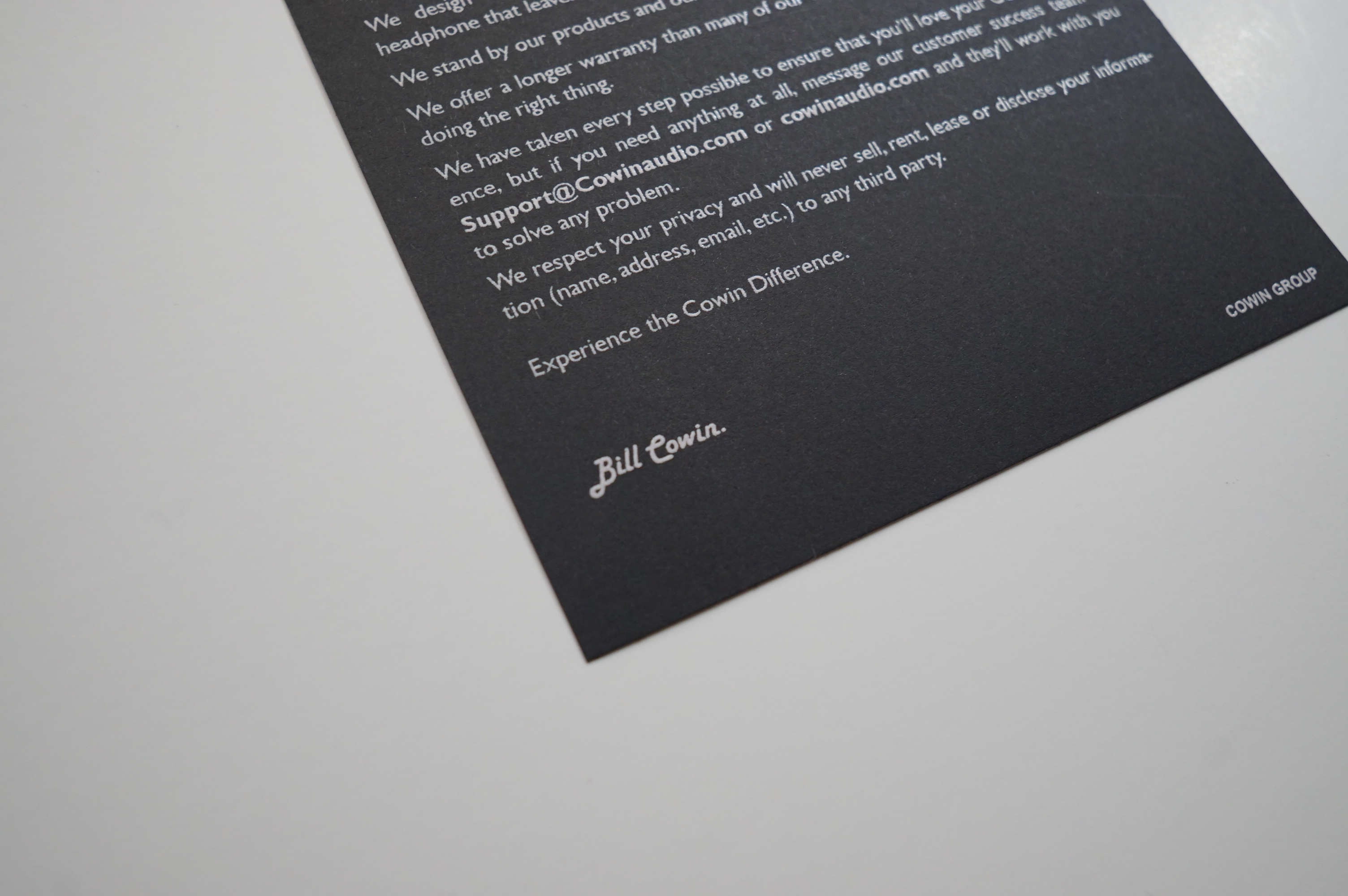
I thought the note was nice a touch to the packaging. The founder’s name is Bill Cowin and it looks like the headphones are named after him. I was curious to learn more about his audio engineer background so I tried to find out more about him on Cowin’s website. There’s no information about him on the website and even a quick Google search returned no results. I concluded that this person was in fact not real and this is just a Chinese company that sells headphones under a fake founder called Bill Cowin. This begs the question: what gives?
When I visited China about 10 years ago, my cousin pointed out how so many Western brands were named after their founders, which is different for Chinese brands. In China, the names are usually tied to what the product was about, not who the founder was. For example, Lima (立马) sells electric scooters in China, I saw them everywhere when I visited. In Chinese, the name translates to “immediately”, so it might describe how quickly you can get to your destination with the scooter. I never noticed until I recalled the car brands I’ve seen in Canada: Ford, Honda, Mercedes, Porsche, etc. So my conclusion with Cowin is they wanted to be more modern by being more Western and adopted this pattern of converting a founder’s name into the brand. Or maybe, they wanted to give more credibility to their brand. The story behind the fake founder was that they had a dream in audio engineering. So by supporting this company, we are supporting a person’s dream. It has a nice ring to it for a brand. This whole act Cowin pulled off points to an interesting topic of discussion: the personal presence of the founder in the brand. How important is it to a brand for the founder to be part of the brand? This question might seem silly to ask since it seems to obvious, but it’s important to establish. Let’s get into it.
Personal presence is often overlooked
Whenever I visit a new website I know little about, I would always make sure to check out the “about” page. My intent is to find more information about the company. The “about” page is crucial to help visitors understand who they are interacting with. In the context of e-commerce, it’s a page that has potential to establish trust with the customer:
In Shopify’s customer trust research, we found that shoppers navigate to an About Us page to learn more about the brand and the people behind the products. Your About Page should address those two curiosities shoppers have to help with decision making. Shoppers are also interested in a company’s mission. They’ll use the About Us page to determine if they share core values with the business and to decide if they want to shop with the business or not. Shopify, 2021
It’s clear that the “about” page is important, yet I see many merchants skimp on it. They put so much energy on getting the design right and spend money on ads to bring traffic to their site. If the store hasn’t crafted a good “about” page, then customers who visit the store can’t make a decision if they want to buy from the brand or not.
I’ve encountered many Shopify stores that don’t have an “about” page or have one that sounds like it was copied from somewhere else.
The problem with most About Us pages is that they’re an afterthought — a link buried at the bottom of the page that leads to a few hastily written paragraphs about a company. (Shopify, 2021)
Here’s an example from a rug store that doesn’t have an “about” page on their in their header or footer. There is no way for me to learn more about who is running the shop and why I should consider buying from them.
Here’s an example of copy found on the an “about” page from a new watch company. Honestly, it just feels too generic. There’s buzzwords like minimalist, quality, and style. These are important, but there are many other companies who claim similar promises. As I was reading this, I didn’t find a connection to it at all.
What this copy is lacking is a personal presence. Personal presence is adding another layer to the brand’s story. It goes beyond why the company was founded, it digs into the founder’s life and shows the founder’s profile photo. It is an opportunity for the customer to build a relationship with the brand where the founder acts as the proxy. Take a minute and read this post below. It immediately draws you in. By nature, humans engage with a good story. We just can’t help it. It’s what our hearts crave. This post is about the story of ATOMS, a shoe company based in New York founded by a married couple from Pakistan. They have an insane story of how they’ve overcome so much to get their business off their ground. It’s incredible.
Their story is what will make their brand unique because no one else has a story like theirs. Their story is what will engage customers and get them to come back. Their story will make their brand memorable. And there’s proof that telling their personal story has worked.
What makes their story stand out is that they shared struggles and vulnerabilities. This is what makes us human. It’s not the clout or the pedestal we stand on, it’s about how we live as a human being. To be human means we naturally encounter resistance to succeed. Everyone goes through it, but is too ashamed to talk about it. Those who have the courage to share their real story will allow other people to feel their voices are heard and this is the start of how you can build a community around a brand.
Now that we are in a pandemic, there has been so many people who started a new business. Even if you don’t have a crazy story about your brand, being honest and relatable is more than enough. If you said something like “Just like most people, I lost my job during the pandemic. With extra time on my hands, I picked up an old hobby and decided to turn that into a business”. It’s tempting for folks to think that customers will focus on the shameful aspect of being fired. But, this isn’t something to be ashamed of, in fact, it points to how you are resourceful. There will be many customers who can relate to your story and what you do. This is the start of building a relationship with customers.
You might challenge me and say: “Jane, look at this site, they look like they are doing well and they don’t have any personal presence in their brand. Sure, there are lots of people who can do well without it, just like how my mom has successfully built her business for 30 years without a website or social media. Have you ever seen websites of small businesses that are busy? Their site looks like it’s from the stone age, and that’s because they don’t get their sales from it. They rely on word-of-mouth, i.e. referrals.
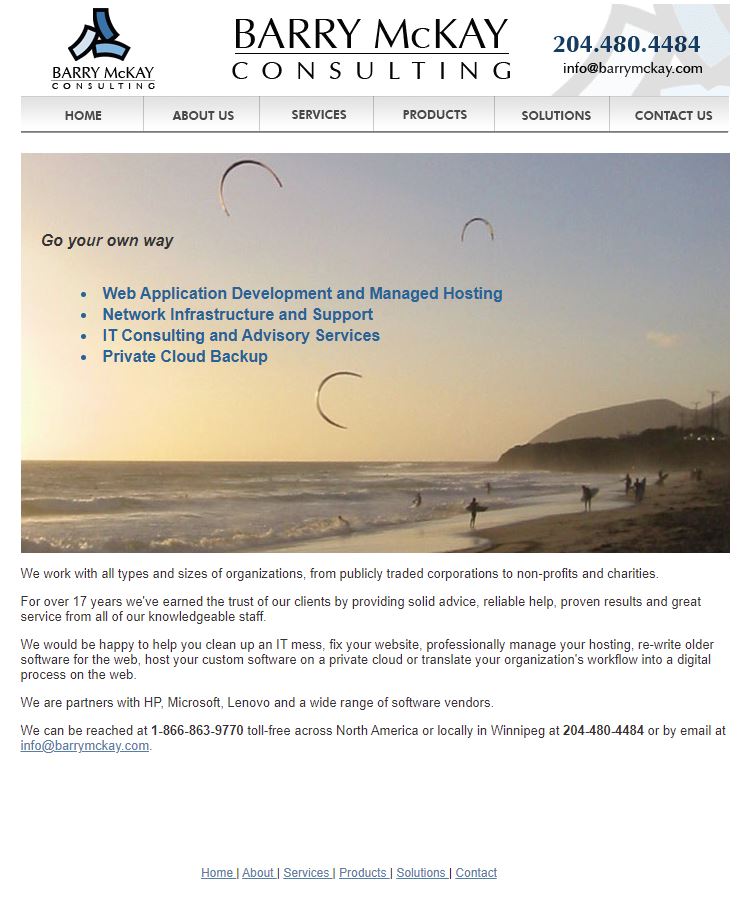
No joke, this is a real website I found in 2021. It’s a Canadian company that provides IT services and they are super busy. This website looks like it’s from the early 2000's.
New companies that can’t rely on word-of-mouth marketing need to stand out in other ways. I believe it’s mandatory for small businesses to integrate a personal presence in their store. Because how else are you going to compete with Amazon? If you don’t focus on the personal human side of your brand that people can relate to, you don’t stand a chance against established brands.
Have you ever tasted competence?
I heard this quote in a YouTube video clip about business expertise. It was very provocative and it made me think. An example of competence relevant in our context was when I went to a shoe repair store to buy some leather cream. I had a pair of red sneakers that was losing its shine. I picked up a jar of red coloured cream off the shelf and took it to the register. The staff looked at it, then glanced at my shoes: “Is this for those shoes?”, I nodded. He then said “What you need is the white cream, the red one will ruin the colour of your shoes”. Two things happened here. The first was that he prevented me from destroying my shoes, the second was that he quickly diagnosed what my problem was and prescribed the correct solution. Ah, this is what a real expert looks like: someone who knows my pains and has the solution ready. The true value of expertise is that it will minimize risk of an undesirable outcome. If you ever sought out a friend for product suggestions, your intent is to buy the best one for your needs and avoid the ones that will waste your time and money. This leads to the point of why having a personal presence is important. It is a way to display your expertise and get customers to trust you. If you can pinpoint pain point and solve it before it happens, customers learn that you have their best interests in mind. A huge bonus of expertise is that it’s strong differentiator from competitors. It’s easy for anyone to sell shoe cream, heck, I could do it without any knowledge of shoes. But, it’s much harder to develop expertise and if you have it, you need to show it.
Here’s an example from a Canadian retail chain, Indigo. Its core product offering are books. When you visit the store or their site, there’s a section that’s called “Heather’s Picks”, named after the founder Heather Reisman.
Since 1998, she’s been the face of 262 “Heather’s Picks,” the Oprah-esque seal (or sticker) of approval that comes with a money-back guarantee and has emerged as a reliable sales driver. “Almost all Heather’s books end up selling quite well,” she says… (The Toronto Star, 2016)
I pulled the screenshot below directly from Indigo. Right below the fold, it prominently displays that these picks are from Heather and that she has actually read the books she recommend. Even for an established brand like Indigo, the CEO’s personal presence is a sales-driver for the business.
Ms. Reisman has made herself and her own tastes and interests central to the brand. The front of the New Jersey store features a section labeled “Heather’s Picks,” with a display table covered with dozens of titles. A sign identifies her as the chain’s “founder, C.E.O., Chief Booklover and the Heather in Heather’s Picks.
When a customer sees a table of books with the approval seal directly from the CEO, they should feel some reassurance that the books recommended will be good quality reads. The challenge with books is that there is too many of them. Where do you start? What book is worth a read? Curation is an essential function in the customer experience because it reduces cognitive load. It makes it easier for customers to make a choice and with Heather’s Picks, a customer can feel confident about their purchase. Why? Because Heather owns a retail chain selling books for decades, she must know what a good book looks like right? She has seen thousands of books and has the expertise to decide what customers will enjoy. This leads to a virtuous cycle where customers will come back for more because the experience was so good.
Most Heather’s Picks grab her from the first page. If she isn’t hooked after 20 pages, she’s done. “Literally 20 pages,” she says.
Quick recap
I know there’s a lot to unpack here so let’s take a moment to summarize. Two key points I am trying to deliver about personal presence in your brand as a small business:
-
Personal presence matters to build a relationship with customers. It is a way for customers to relate to your brand. People are better at relating to a real human being than a logo. Put a face to your business and talk about yourself. Give customers a way to decide if your products align with their values.
-
Personal presence matters to show you as an expert in your industry. Customers will more likely trust you if you can display competence. Can you actually solve their problems? In fact, can you predict future problems before they occur and offer a solution for them?
Actionable ideas
It can be a challenge to find ways to express your personal presence via an online store. It’s not so hard in-store because the staff are present and can guide the customer to the best product for their needs. Here are some ideas I recommend.
Optimize your “about” page
Everyone names it differently, maybe the page is called “about us” or it’s “our story”. For simplicity, I am going to call it “about” page. On this page, include these four pieces of information:
-
A professional shot of your profile photo, you can do this with your smartphone. Here’s a 3- min video tutorial .
-
Your name and your background related to your products. Why are you selling your products? How does it align with your values? What is your past history with your product category? If you sell sexy lingerie, did you have experience working in retail selling them? Or maybe you have a lot of personal experience with them and have spent your free time looking at the products online. You don’t need professional experience, but the basics is industry knowledge. It’s OK to not know everything at the beginning, what’s important is you build discipline to learn the knowledge.
-
Your business journey. Talk about how it started and some business wins and challenges you faced. If you spent countless hours researching and developing your products, take behind-the-scenes shots of you sweating it out. Let the customers feel your passion and efforts.
-
Your vision. What is your goal with your business? Think big-picture and go beyond the company vision statement. What is the future you envision to create? How will it better the planet and the lives of others?
The example below is from a Latvia-based studio and they did an exceptional job writing about themselves and what they believe in. Bonus points that they included their business values. The copy feels like a story you could tell around a campfire, it’s very approachable and easy to read. If you check out their blog , they go deeper into the founder’s story. A great way to generate content.
Geek out about the product category
This is something I don’t see people do enough, especially if you have some previous experience with the product category. Say if you are in the makeup industry and you sell cosmetics, then why not talk about the history of makeup and their influence in pop culture? A great example is this video by Lisa Eldridge, she talks about Marilyn Monroe’s makeup look and tries to recreate it. It’s a great way to show people your enthusiasm for the industry.
You can also talk about your favourite products that have inspired you. If you make watches, maybe you grew up with a Casio watch and you can write a blog post about the impact of that watch on you and the world. There are many opportunities for you to expose your expertise.
Answer questions from social media
This is the easiest one to do because the prompt is already there. Say you sell office chairs, you can go on Reddit and go into the discussions people have about the topic. With a quick search, I found a subreddit called “officechairs”. I found a couple questions people have about their next purchase:
What surprises me is that most of these go unanswered. There is a huge opportunity for a salesperson to go into these forums, learn about the pain points people are experiencing, and offer a solution with their products. Even if you don’t pitch them your products directly, the best you could do is engage them and get better at being a consultant. Personally, this tactic is most effective if you are a store owner that is not biased to a brand. So if you specialize in home office furniture and carry products from other manufacturers, then people will trust you more than if you sold your own product. This is because people will sense you aren’t giving them the best solution, you are just trying to sell your own products.
If you want to take this to the next level, take a screenshot of these posts, and write a blog post, then respond to the Reddit post with a link to your blog post. You can take it up one more level and reach out to them to book a 30 minutes consultation. Really get to know their challenges and understand how you can help.
Build a relationship with customers and be empathetic
Personal presence isn’t complex. It’s about being open and revealing who you are to people. It’s a way for people to learn about who you are and understand what makes you tick. At the end of a day, it’s just about the basics of building a relationship. Customers go into a store looking for some form of a solution. Usually it’s emotional, most of the time they say it’s functional. Talk to them at a personal level by talking about yourself. If you were ever to make a new friend, you would reveal a bit about yourself so they can know you and decide if they want to be acquainted with you. Do the same for an online store. Tell people about who you are, be present, be personal.
Comments




